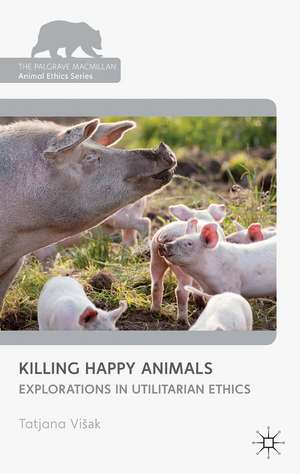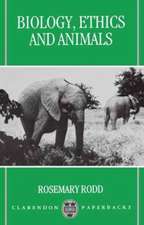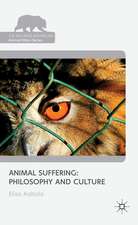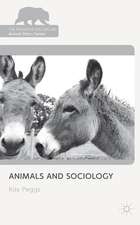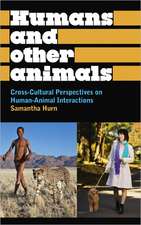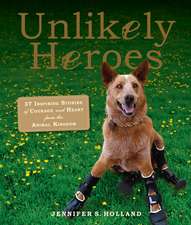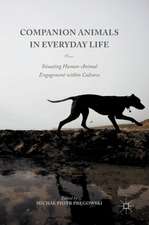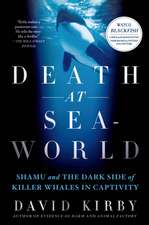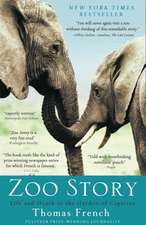Killing Happy Animals: Explorations in Utilitarian Ethics: The Palgrave Macmillan Animal Ethics Series
Autor Kenneth A. Loparoen Limba Engleză Hardback – 23 aug 2013
| Toate formatele și edițiile | Preț | Express |
|---|---|---|
| Paperback (1) | 380.45 lei 6-8 săpt. | |
| Palgrave Macmillan UK – 23 aug 2013 | 380.45 lei 6-8 săpt. | |
| Hardback (1) | 583.61 lei 6-8 săpt. | |
| Palgrave Macmillan UK – 23 aug 2013 | 583.61 lei 6-8 săpt. |
Din seria The Palgrave Macmillan Animal Ethics Series
- 18%
 Preț: 786.52 lei
Preț: 786.52 lei - 8%
 Preț: 588.34 lei
Preț: 588.34 lei - 8%
 Preț: 538.07 lei
Preț: 538.07 lei - 20%
 Preț: 814.16 lei
Preț: 814.16 lei - 20%
 Preț: 691.10 lei
Preț: 691.10 lei - 17%
 Preț: 524.04 lei
Preț: 524.04 lei -
 Preț: 224.33 lei
Preț: 224.33 lei - 18%
 Preț: 1238.56 lei
Preț: 1238.56 lei - 18%
 Preț: 894.46 lei
Preț: 894.46 lei - 15%
 Preț: 648.24 lei
Preț: 648.24 lei -
 Preț: 384.86 lei
Preț: 384.86 lei - 15%
 Preț: 590.49 lei
Preț: 590.49 lei -
 Preț: 390.63 lei
Preț: 390.63 lei -
 Preț: 482.17 lei
Preț: 482.17 lei -
 Preț: 384.86 lei
Preț: 384.86 lei -
 Preț: 485.24 lei
Preț: 485.24 lei - 18%
 Preț: 883.75 lei
Preț: 883.75 lei - 18%
 Preț: 727.97 lei
Preț: 727.97 lei -
 Preț: 383.93 lei
Preț: 383.93 lei -
 Preț: 380.45 lei
Preț: 380.45 lei - 18%
 Preț: 737.12 lei
Preț: 737.12 lei - 15%
 Preț: 644.18 lei
Preț: 644.18 lei - 15%
 Preț: 698.15 lei
Preț: 698.15 lei -
 Preț: 385.84 lei
Preț: 385.84 lei - 18%
 Preț: 1111.53 lei
Preț: 1111.53 lei -
 Preț: 380.25 lei
Preț: 380.25 lei - 18%
 Preț: 780.82 lei
Preț: 780.82 lei - 15%
 Preț: 700.94 lei
Preț: 700.94 lei - 15%
 Preț: 639.73 lei
Preț: 639.73 lei - 15%
 Preț: 703.52 lei
Preț: 703.52 lei -
 Preț: 414.21 lei
Preț: 414.21 lei - 18%
 Preț: 787.47 lei
Preț: 787.47 lei - 18%
 Preț: 723.24 lei
Preț: 723.24 lei -
 Preț: 379.68 lei
Preț: 379.68 lei -
 Preț: 383.93 lei
Preț: 383.93 lei -
 Preț: 383.12 lei
Preț: 383.12 lei
Preț: 583.61 lei
Preț vechi: 686.60 lei
-15% Nou
Puncte Express: 875
Preț estimativ în valută:
111.71€ • 121.38$ • 93.90£
111.71€ • 121.38$ • 93.90£
Carte tipărită la comandă
Livrare economică 21 aprilie-05 mai
Preluare comenzi: 021 569.72.76
Specificații
ISBN-13: 9781137286260
ISBN-10: 1137286261
Pagini: 188
Ilustrații: IX, 188 p.
Dimensiuni: 140 x 216 x 18 mm
Greutate: 0.41 kg
Ediția:2013
Editura: Palgrave Macmillan UK
Colecția Palgrave Macmillan
Seria The Palgrave Macmillan Animal Ethics Series
Locul publicării:London, United Kingdom
ISBN-10: 1137286261
Pagini: 188
Ilustrații: IX, 188 p.
Dimensiuni: 140 x 216 x 18 mm
Greutate: 0.41 kg
Ediția:2013
Editura: Palgrave Macmillan UK
Colecția Palgrave Macmillan
Seria The Palgrave Macmillan Animal Ethics Series
Locul publicării:London, United Kingdom
Cuprins
Series Editors' Preface Introduction 1. Utilitarianism and Animal Husbandry 2. Animals and the Harm of Death 3. The Replaceability Argument 4. Total View versus Prior Existence View 5. Can Existence be Better for a Being than Non-Existence? 6. Person-Affecting Restriction and Non-Identity Problem 7. Repugnant Conclusion and Expected Misery Argument 8. Veganism versus Animal-Friendly Animal Husbandry Conclusions Appendices Bibliography Index
Recenzii
"In Killing Happy Animals, Tatjana Visak probes a question that is crucial to the ethical evaluation of eating meat: whether bringing animals into existence benefits them, and can compensate for killing other animals. Those who believe it justifiable to kill one happy animal if it will be replaced by another will be challenged by Visak's clearly argued case against this view. This book makes a major contribution to a philosophical debate with important practical implications." - Peter Singer, Professor of Bioethics, Princeton University
"Our relationships with other animals are extremely challenging and all too often contradictory. For example, the broadly accepted moral ideal of animal-friendly animal husbandry holds that it is okay to keep and routinely kill animals for food, provided that they are granted "pleasant" lives. Along these lines, Tatjana Visak asks, 'How can it be justified that we are not allowed to kick them, while we are allowed to kill them?' Is animal-friendly animal husbandry a contradiction in terms? In Killing Happy Animals Visak explores possible answers to this pressing question. She provides necessary resources for re-thinking animal ethics, public policy, and our daily consumption of other animals. This timely book is highly recommended for those who are willing to re-think ethics and our relationship to other animals." - Marc Bekoff, Professor Emeritus, University of Colorado, USA
"It is increasingly the conventional wisdom among right-minded people that it is permissible to eat meat so long as the animals have happy lives and are painlessly slaughtered. Tatjana Visak digs deep into the utilitarian foundations of this comfortable philosophy and concludes that it is wrong: most of us are morally obliged to live a vegan life-style. Visak's arguments must be confronted by anyone who claims to be a conscientious consumer." - Prof. Dale Jamieson, Director of Center for Bioethics, New York University, USA
"Our relationships with other animals are extremely challenging and all too often contradictory. For example, the broadly accepted moral ideal of animal-friendly animal husbandry holds that it is okay to keep and routinely kill animals for food, provided that they are granted "pleasant" lives. Along these lines, Tatjana Visak asks, 'How can it be justified that we are not allowed to kick them, while we are allowed to kill them?' Is animal-friendly animal husbandry a contradiction in terms? In Killing Happy Animals Visak explores possible answers to this pressing question. She provides necessary resources for re-thinking animal ethics, public policy, and our daily consumption of other animals. This timely book is highly recommended for those who are willing to re-think ethics and our relationship to other animals." - Marc Bekoff, Professor Emeritus, University of Colorado, USA
"It is increasingly the conventional wisdom among right-minded people that it is permissible to eat meat so long as the animals have happy lives and are painlessly slaughtered. Tatjana Visak digs deep into the utilitarian foundations of this comfortable philosophy and concludes that it is wrong: most of us are morally obliged to live a vegan life-style. Visak's arguments must be confronted by anyone who claims to be a conscientious consumer." - Prof. Dale Jamieson, Director of Center for Bioethics, New York University, USA
Notă biografică
Tatjana Višak is a lecturer at the Centre for Human Bioethics at Monash University, Australia. Previously she has worked as a lecturer/researcher in ethics at various Dutch universities. Her special interests are Animal Ethics, Bioethics, Utilitarianism and Value Theory.
